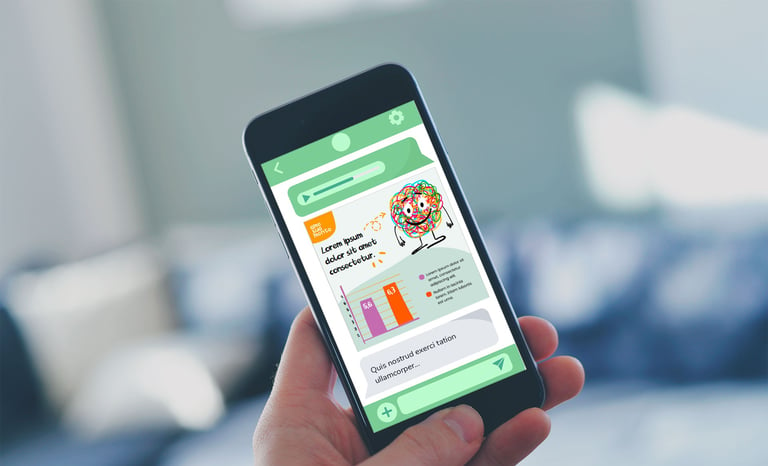Mental health education
Love Your Mind Institute | Mental health training for public school educators
Responsibilities
Instructional design, product-owner.
Audience
Public school teachers.
Tools
Google Workspace, Adobe CC, Octopus framework, LMS.
Methodologies
Microlearning, storytelling, andragogy.









How might we support public school teachers in addressing self-harm and mental health with accessible, flexible, and empathetic learning experiences?
The solution is part of the Bússola Project, which develops accessible content and courses to support public school teachers on topics related to mental health.
Considering the audience profile and learning context, we chose to offer a course made available via WhatsApp, a disruptive form of online course, ideal for enabling continuous access, on the move, to practical content, in small doses of information (microlearning).


1
5+
content formats
chatbot, multiple paths


PROCESS
ADDIE model
Design
Based on the findings from the analysis, the course structure was designed with the following pedagogical strategies:
Microlearning format: content broken into small, digestible learning units.
Conversational flow: learning experience structured as a dialogue with a chatbot, simulating natural interaction.
Multimodal content: combining text, image cards, infographics, short audios, and animated videos with captions to ensure accessibility and varied engagement.
Linear progression with decision points: most content followed a defined sequence, with key moments offering path choices to deepen learning based on interest or need.
Learning objectives were mapped using Bloom’s taxonomy to ensure cognitive progression, from understanding to application in real-life scenarios.
Development
During this phase, all educational assets were created and tested:
Scripting: Dialogue scripts for the chatbot were written to ensure clarity, empathy, and inclusivity, aligned with the sensitive nature of the topic.
Visuals and media: Infographics, videos, and cards were designed with accessible language and clear design for mobile-first consumption.
Chatbot programming: Built on a decision-tree logic using the Winnie platform, with interaction tracking and content release based on user engagement.
Pilot testing: A beta version of the course was tested with a small group of educators, gathering feedback on usability, tone, and comprehension.
Analysis
In the initial phase, we conducted a thorough needs assessment to understand the context of public school educators working with students at risk of self-harm. Key steps included:
Interviews with educators and mental health specialists to identify knowledge gaps and emotional barriers.
Analysis of the daily realities and digital access patterns of teachers in the public education system.
Identification of WhatsApp as the most accessible and inclusive platform for course delivery.
Definition of learning goals: increase educators’ understanding of mental health, signs of self-harm, appropriate responses, and available support networks.
Implementation
The course was launched via WhatsApp using a distribution strategy coordinated with school networks:
Educators enrolled through an automated sign-up process.
They received daily content "pills" directly through the chatbot, with reminders sent after periods of inactivity.
Support materials and a help channel were made available for any technical or emotional issues during the journey.
Facilitators and school managers were also briefed to support educators locally.
Evaluation
Evaluation occurred in two dimensions:
Formative evaluation: Continuous monitoring of user interaction with the chatbot (clicks, replies, drop-off points) allowed iterative improvement during early rollout.
Summative evaluation: At the end of the course, participants completed a feedback form measuring:
Self-perceived knowledge increase
Relevance and clarity of the materials
Likelihood of applying learning in practice
Additional long-term impact evaluation is planned through qualitative interviews and follow-up surveys.
RESULTS
The project successfully delivered an accessible and engaging learning experience to public school educators, fostering greater awareness, empathy, and preparedness to address mental health and self-harm in the school environment. Through a conversational and mobile-first approach, the course encouraged continuous learning and reflection, empowering educators to better support their students while inspiring new possibilities for inclusive and impactful education.
★★★★★

